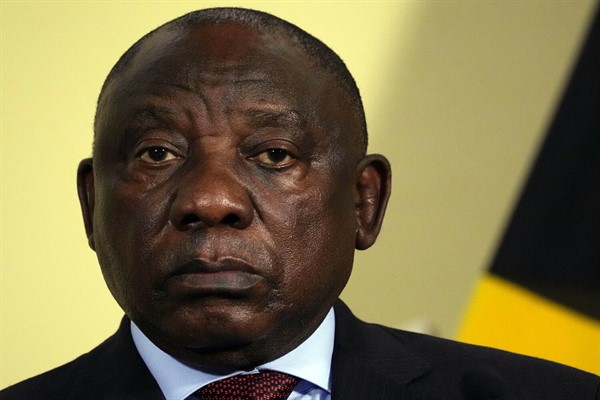But the report finds fault with Ramaphosa as well, accusing him and other top ANC officials of doing little to respond to the widespread corruption in party and state affairs. Their indifference, according to the report, allowed a culture of impunity to take root in South African politics. Crucially, Fraser, a close ally of Zuma who was regarded as one of the most powerful officials during his administration, is also named in the commission’s report. Fraser faces allegations of corruption stemming from an investigation into his tenure as head of the SSA, during which he is alleged to have misappropriated millions of dollars and authorized unlawful surveillance operations. Many allies of Ramaphosa, who pushed Zuma from power under a cloud of disgrace, argue that Fraser’s allegations are now part of a plan by Zuma’s allies to discredit Ramaphosa and weaken him ahead of his bid for reelection as ANC leader. Whatever Fraser’s motivations, Farmgate is certain to have widespread ramifications. The ANC’s longstanding position as South Africa’s political leviathan has come into question in recent years, and it faces an increasingly treacherous electoral terrain following humbling losses in last year’s local elections. The party has lost ground with South African voters in recent years, and even though it rode the wave of Ramaphosa’s popularity to victory in the 2019 general elections, its 57 percent of the vote represented its lowest share since South Africa’s post-Apartheid transition to democracy in 1994. More importantly, the scandal has put a dent in Ramaphosa’s anti-graft credentials, and his decision to suspend South Africa’s graft ombudsman did little to help restore that credibility. On the eve of the battle to save his presidency, Ramaphosa could face the prospect of legal jeopardy as well as political uncertainty. Before Farmgate, he was seen as likely, if not quite certain, to be reelected to another term as the ANC’s president. His main rivals for the position were seen as politically wounded, if still formidable. His allies control the party’s national executive committee, while the party structures in the country’s provinces were broadly seen as likely to back Ramaphosa’s bid for a second term. But the scandal could easily change the political calculus among the ANC faithful. The ANC’s party chapter in Gauteng—the most populous province and the country’s economic nerve center, where Johannesburg is located—just elected new leaders after a drawn-out provincial conference. The party chapter in KwaZulu-Natal province, the second-most populous of South Africa’s nine provinces and a stronghold of Zuma’s faction, is set to hold its elective conference in July. Given Zuma’s continued popularity there, the results in the two provinces are expected to foreshadow the dynamics likely to determine the party’s national conference this December. But all of those considerations could easily become moot if Ramaphosa is charged with a crime. In that event, the pressure for him to resign will almost certainly intensify, and he will find it untenable to hang on to leadership of the party, to say nothing of South Africa’s presidency. In such a scenario, should Ramaphosa defy calls to honor the “step aside” rule, it would almost certainly cause nationwide outrage and perhaps even another uprising much like last year’s, triggered by Zuma’s arrest for refusing to cooperate with the Zondo Commission. In the long term, Ramaphosa’s defiance would damage institutional norms in the ANC as well as in the national government, deepening the culture of impunity that the Zondo Commission identified and that Ramaphosa pledged to eradicate. For the time being, Ramaphosa’s allies in the party’s leadership are circling the wagons against their internal factional rivals, as well as the opposition and civil society groups calling for more transparency and accountability. But even if Ramaphosa and his allies can stave off this controversy until after December, they may not be so fortunate in 2024, when the country will hold its next general elections. Amid an electoral landscape where there are serious doubts about the party’s ability to win an outright national majority, the ANC will have no shortage of tough decisions to make in the coming months.On the eve of the battle to save his presidency, Ramaphosa could face the prospect of legal jeopardy over the Farmgate scandal, as well as political uncertainty.
Chris O. Ogunmodede is an associate editor with World Politics Review. His coverage of African politics, international relations and security has appeared in War on The Rocks, Mail & Guardian, The Republic, Africa is a Country and other publications. Follow him on Twitter at @Illustrious_Cee.

